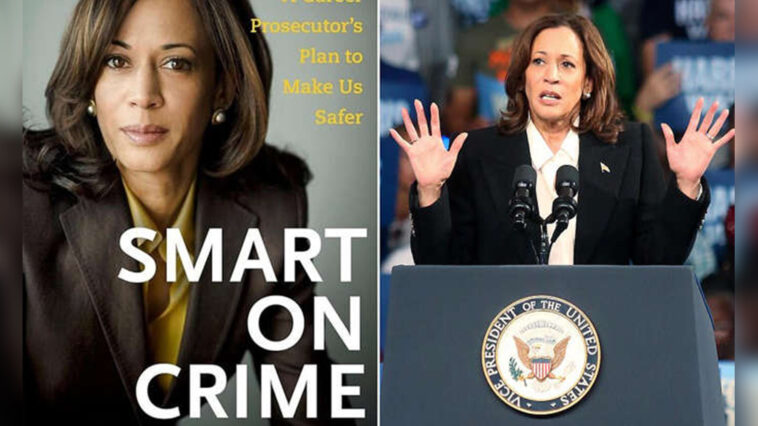In a recent turn of events that could have significant implications as the 2024 presidential election approaches, Vice President Kamala Harris has been accused of plagiarizing substantial portions of her criminal justice book, Smart on Crime: A Career Prosecutor’s Plan to Make Us Safer. This allegation stems from an investigation led by journalist Christopher Rufo, who claims that Harris copied content from various sources without proper attribution, including Wikipedia, press releases, and reports.
Rufo asserts that Harris “plagiarized at least a dozen sections” from her book, highlighting instances where she reportedly lifted material directly from Wikipedia and other sources. This accusation raises questions about her integrity as a writer and public figure, especially during a time when scrutiny of political candidates is heightened.
The investigation involved the expertise of Stefan Weber, known as a “plagiarism hunter” for his work uncovering similar infractions among politicians in the German-speaking world. Weber’s examination allegedly revealed over a dozen instances of what he termed “vicious plagiarism fragments” in Harris’ book, with sections of text copied verbatim without any citation.
One particularly striking example cited by Rufo involves a section of Smart on Crime that appears to have been taken directly from a press release issued by the John Jay College of Criminal Justice. In this instance, Harris allegedly used the language exactly as it was written in the press release, failing to provide any credit to the original source. Moreover, she is accused of copying from an NBC News report on high school graduation rates, again neglecting to attribute the source.
Rufo emphasized the seriousness of the issue, stating, “They not only lifted material from sources without proper attribution, but in at least one case, relied on a low-quality source, which potentially undermined the accuracy of their conclusion.” This remark not only questions Harris’ credibility but also calls into doubt the reliability of the information presented in her book.
The allegations are particularly troubling considering that Harris was writing Smart on Crime in 2008. During this time, it is reported that she copied text from a Wikipedia article almost verbatim, including a factual error that existed on the page at the time. Additionally, the book allegedly contains material lifted from a Bureau of Justice Assistance report on crime statistics for West Palm Beach, further highlighting the lack of original content.
Rufo’s concluding statement on the matter resonates strongly: “There is nothing smart about plagiarism, which is the equivalent of an academic crime.” This comment underscores the serious implications of these allegations, especially for someone in a prominent political position like Harris.
The news has not gone unnoticed by Harris’ political opponents. Former President Donald Trump’s campaign, along with his running mate Senator J.D. Vance, quickly seized upon the revelation to criticize the Vice President. Trump tweeted, “Lmao Kamala didn’t even write her own book!” This statement underscores the perception that Harris lacks authenticity and originality, which could impact her public image as she seeks to solidify her political standing ahead of the upcoming election.
Donald Trump Jr. also weighed in, stating, “Yikes! More evidence that Kamala Harris is a fraud!!!” Such comments from high-profile figures in the Republican Party amplify the potential fallout from these plagiarism allegations, framing Harris as an untrustworthy candidate unworthy of the public’s confidence.
As the 2024 presidential election approaches, these allegations may pose a significant challenge for Harris and her campaign. The seriousness of plagiarism accusations not only raises ethical questions but also detracts from her message and goals, potentially alienating voters who value integrity and authenticity in their leaders.
In the political arena, trust and credibility are paramount. As the investigation into Harris’ book continues, it will be crucial for her to address these allegations directly and transparently. The outcome of this situation may not only affect her political future but also influence the broader narrative of accountability among politicians, particularly in an era where information is readily available and easily scrutinized.






Join the Community and Be a Part of the Conversation
You must be logged in or registered to post a comment.